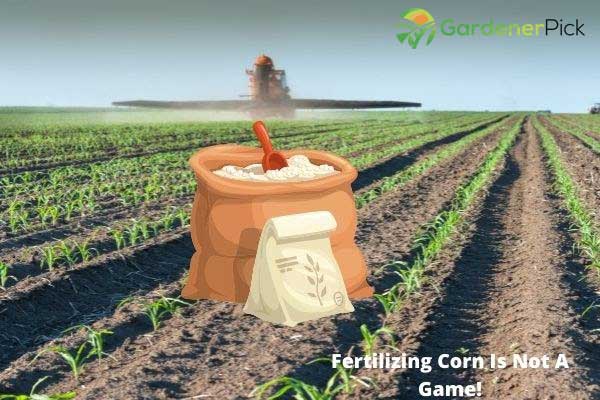Are you interested in growing corn this year? If so, you might be confused about the nutritional requirements of this plant. How much Nitrogen, Potassium or Phosphorus should you apply? How to prepare land for corn furrows?
Indeed corn is a profitable crop to grow. But if growers don’t manage the crop to ensure high yield, they have to face big losses. It is too expensive to grow. It requires fertilizer not only as a starter but also in the growing stage of the plant.
Let’s read out corn fertilizer recommendations in this post.
Corn plants require a 12-6-10 ratio of N, P, and K for every 10 bushels. For 150 bushels it needs 180 pounds of Nitrogen per acre. For 200 bushels, you go up to 240 pounds, and for 250 bushels, go to 300 pounds. For 300 bushels per acre, more than 360 pounds of Nitrogen is sufficient.
Don’t focus only on Nitrogen. Some other micronutrients like zinc boron also play a vital role in the growth of corn. It’s a better idea to check soil fertility for availability and deficiencies of nutrients. After this, make a proper plan for fertilizing your fields.
Table of Contents
Corn Fertilizer Recommendation
For profitable production, cornfields require a proper fertilizing plan. It is imperative to choose the right nutrients in the right amount at the right time. Below are three main factors to consider before planning fertilization for cornfields
3 Factors To Consider Before Applying Fertilizer To Corn
Fertilizer management requires in-depth research. First, land is prepared and then seed variety is selected according to soil fertility. Let’s discuss 3 main factors to consider before fertilizing corn:
1- Expected Yield Of Chosen Variety
It is important to set yield goals first. After setting this choose varieties of seed to meet yield goals. New varieties are mostly hybrid and high yielding. Such varieties demand high nutrients.
To produce 230 bushels per acres out of new hybrid corn variety, the following nutrients are required in lbs/acres
Table Of Nutrients For 230 bushels per acres:
Nutrients | lbs/acres |
N | 247 |
P2O5 | 192 |
K2O | 194 |
Cao | 80 |
MgO | 75 |
S | 23 |
Fe | 2.6 |
Mn | 0.45 |
Zn | 0.5 |
Cu | 0.125 |
B | 0.32 |
2- Fertility Of Soil
For better fertilizing management, test your soil. Test PH and availability of nutrients already present in the soil. The Soil test will also help to determine deficiencies of micronutrients as well as macronutrients. After this plan fertilizer, keep the values of the soil test in your mind. For more acidic soil, the recommendations are different.
3- Fertilizing According To Corn Growth Stage
Corn requires different rates of nutrients at different stages of growth. From sowing to vegetation stage it requires different phosphorus, potassium and nitrogen rates. It’s not a good idea to fix a single fertilizer through the growing phase. That’s why considering growth requirements at different levels of growth is a crucial factor.
Starter Fertilizer For Corn
Growers traditionally use small amounts of Nitrogen and Phosphorus as a starter fertilizer for corn furrows. Researchers found potassium effective as a starter phase. However, it did not affect yield at all. But growers prefer to use potassium more than nitrogen and phosphorus in furrows.
Studies show that growers are comfortable with using 10 gallons of NPK with a ratio of 10-30-40 on corn furrows. They are even OK with not using Nitrogen at all in the furrows.
Corn planted in cool temperatures like Feb to April may need less phosphorus intake.
Applying starter fertilizer 2 inches to the side of the seed and 2 inches below the seed will increase the penetration rate of roots. Hence more Nitrogen and Phosphorus will nourish plants.
It is always better to test soil for the availability of phosphorus. If you are planning to grow corn on new ground, always test its soil for phosphorus availability. It can affect yield.

Fertilizer Recommendation For Bushels of Corn
Fertilizer recommendation for corn depends on the number of bushels per acre. In Georgia, irrigated base rates are 150 bushels per acre. Let’s see how much fertilizer is required as growers add up bushels per acre:
Fertilizer Recommendation For 10 bushel
For every 10 bushel increase, the NPK of 12-6-10 ratio is fine. It’s up to your soil fertility and yield goals if you look to add more nitrogen.
Fertilizer Recommendation For 150 bushels
For 150 bushels of corn, growers need 180 pounds of Nitrogen per acre. Remember don’t forget to test your soil fertility first.
Fertilizer Recommendation For 200 bushels
For growing 200 bushels, exceed Nitrogen up to 240 pounds per acre.
Fertilizer Recommendation For 250 bushels
For 250 bushels growth, the N recommendation is 300 pounds per acre.
Fertilizer Recommendation For 300 bushels
For 300 bushels growth, apply 360 or more pounds of Nitrogen per acre.
Nitrogen is the primary factor but there are many other limiting factors. For example weed growth, water, disease control and seed quality.
According to researcher Harris, the recommendation of phosphorous level is
“The recommendation for 200-bushel corn is actually 140. We say that if you have medium-testing phosphorus soils, you only have a 50-percent chance of seeing yield response from adding it. But you don’t need to take that chance — go ahead and put it out there.”
Consider Micronutrients As Well
Studies show that only NPK is not enough for corn. There are other 16 micronutrients that can affect yield also. Zinc is the most important micronutrient of all.
Zinc: 3 pounds per acre
Boron: 1-2 pounds in split application
It’s best to apply boron with nitrogen.
Fertilizer recommendation varies area wise. Depending on soil quality, temperature and available micronutrients the fertilizers recommendation
Minnesota soil is highly fertile. It has been producing a high yield of corn with the same N rate over the last 15 years. Nitrogen rate differs with soil type. It will be different for corn fields where corn is grown following corn. It would also be different for corn following corn on irrigated sandy soil. Read corn fertilizer recommendations in Minnesota here. To read fertilizer recommendations in Manitoba click the link.
Best Fertilizer For Corn
What is the best fertilizer for corn? The best fertilizer for corn is also planned after testing soil fertility. The simple rule of thumb is to go for 2 to 3 pounds of NPK ratio 10-10-10. However, it is not fixed. It may change with the growing season, soil test and growing stage of the plant. Below is the list of the 3 best fertilizers for corn:
- Sweet Corn Fertilizer
- Bioferti Corn Steep Liquor Powder Fertilizer – 55-lb Bag
- Healthy Grow HGR 900 CG30 Corn Gluten, 30-Pound
- Family Farm and Feed | Natural Garden CGM Fertilizer | Granular Mix | 2 Pounds
Frequently Asked Questions
How Much Fertilizer Do I Need For 1 Acre of Corn?
For good fertility conditions of soil, 10 pounds of starter fertilizer per acre is sufficient. Excessive N +k2O per acre can injure seedling. So don’t apply more than 70 pounds on N + K2o. However, phosphate is essential as a starter fertilizer. It’s good to apply fertilizer at 2 inches wide and 2 inches deep of seedling to get good results.
When Should I Fertilize My Corn?
There are 4 stages of fertilizing corn. You can fertilize it as a starter during furrowing. After this fertilize the plant when it is 4-inch tall with liquid fertilizer of 16-16-8 ratio. You can also add organic mulch when the plant is 3 to 4 inches tall. Lastly, fertilize the plant again when they are about 10 inches tall.
How Much Nitrogen Do I Need For 250 Bushels of Corn?
Corn plants need different amounts of Nitrogen during each growth stage. For 250 bushels of corn growth, the corn would require 250 pounds of Nitrogen. It may also exceed from 250 pounds to 300 pounds.
Final Words
Don’t forget to read corn fertilizer recommendations if you love your cornfields.
It’s not easy to grow this crop without planning fertilization. Nowadays different agriculture websites are introducing corn fertilizing software. You can put the required values of your soil testing to know the deficiency and requirement of nutrients for your land.
It’s also good for growers to go for corn courses if they find any nearby agricultural institutes.



